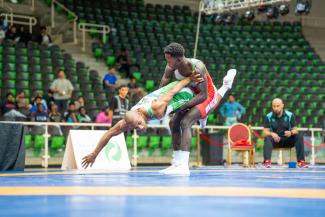Sudan Engages with Development of the National Sports System in Wrestling
Monday, May 21, 2018 - 14:19 By Tim Foley

DARFOUR (May 14) -- For hundreds of years wrestling in Sudan served to build ties between tribes, but today the sport is growing into Olympic territory with the implementation of United World Wrestling and Olympic Solidarity’s implementation of the Development National Sports System (DNSS) program.
The program’s launch took place this May in Khartoum with the visit of Vincent AKA, development officer for Africa who worked with local organizers to conduct the first steps of the DNSS.
Wrestlers from Sudan had recently been motivated to join the sport's global community after the UWW educator Nico Coetzee, conducted a Level One coaching course in the country in 2016
After the recent developments the Sudanese National Olympic Committee on April 22 offered it’s backing for the creation and to support of the wrestling federation through Olympic Solidarity.
The DNSS has three important phases, which will be implemented on the following dates:
Phase 1 (April 22-29)-: Assessment and implementation of Program Implantation of the DNSS. Training camp-talent identification and assessment included eight coaches and thirty athletes. Also, for the first time in Sudan, there was support for women’s wrestling.
Phase 2 (June 18-24): Intermediary evaluation-follow up and recommendations. Evaluation of the senior-level wrestlers and the start of the training camp and talent identification for Juniors and Cadets
Phase 3 (June 23-29): Final evaluation and recommendations of the best Cadets and Juniors, followed by a joint camp for all age groups.




Share your thoughts.
Comments